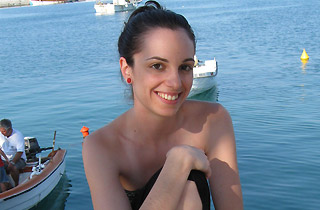| M100 | Board | Venue | Press | Partner/Links | Contact |
| Sanssouci Colloquium | |||
| Media Prize | |||
| Youth Media Workshop | |||
| Offshoot Workshop | |||
| Idea | |||
| 2005 | |||
| 2006 | |||
| 2007 | |||
| 2008 | |||
| 2009 | |||
| 2010 | |||
| Application Texts | |||
| Agenda | |||
| Participants | |||
| Workshops | |||
| Results |
Failed integration / successful integration - My experiences with integration and the media in my country By Anna Petroulaki Within the last 20 years, Greece has been receiving a large number of immigrants, a large portion of it illegal, from neighboring countries, particularly Albania. The geographical location, the large coastline, as well as the multiple islands, make the country a crossroad between different continents and nations, hard to control and easy for migrants to enter. Indeed, the exceeding and uncontrollable import of different kind of migrants, the difficulty to distinguish them- because of the lack of proper documentation- and finally their integration, is a major problem for Greece, currently on discussion for possible solutions. Once settled in the country, immigrants are facing many problems too, as Greece is not properly prepared to welcome them. Except from the practical issues that they have to deal with (residence, work, language), they also have to overcome the obstacles during the process of legalization. Even the legal immigrants, that carry all the necessary documents, become victims of bureaucracy as the application of residential and work permit is really time consuming and very difficult to be accepted. Many immigrants lack the access even to the most basic services, such as education and nursing care, not mentioning the basic rights like voting or standing for elections. The truth is that Greeks are really sensitive and willing to help those being in need, as happened at the beginning of the 1990’s with the first immigrants after the Yugoslav wars, and we also prove our humanity in almost every other difficult occasion. But, unfortunately, this is not always the case with immigrants. After a big scale rise of migration, a new attitude of unjustifiable racism and xenophobia was created toward them. The media presented them as intruders and threat to our economy, to our nation’s composition, even to our lives’ safety. Immigrants were thought to be dangerous, malicious, dirty, currying illnesses, trying to get our jobs and having as a deeper intention to conquer our land- almost the same confrontation that Greek emigrants experienced many years ago. On the contrary, they seem to be important for our economy and none of the above accusations were ever proved. Unfortunately even now, Greek media use stereotypes and reproduce an exaggerating image of reality. Victims of this representation are mostly the Albanians- the majority of immigrants in Greece- the Bulgarians, the Pakistanis and others. Especially the name “Albanian” ends up carrying a negative meaning in Greece. Moreover, many immigrants feel ashamed to admit their origin. It is really ironic that media only characterize an immigrant as “Greek” when doing something really important for the country, such as having a success in the Olympic Games. In addition, Greek media have the tendency to generalize any criminality, even the trivial ones and to assume that the actual reason for any illegal action is the origin of the immigrant. It’s worth mentioning that when a new incident occurs, the first description of the people involved is about their nationality. If it’s Greek, the person is mentioned by his age (e.g. the young man) or by a relative adjective (e.g. the poor man). If the case is about an immigrant, the individual will be characterized by his/her nationality (e.g. the Albanian). Another example of racism is about a paradoxical decision, taken a few years ago, in a Greek village, to forbid the immigrants from appearing in public during the night. That measurement was taken in order to prevent any possible criminal behavior. It was later proved that the local people’s fear had no excuse, as the only incident by Albanian was the theft of some cheese, and that it was the television that made them believe that immigrants are dangerous and could abuse their children when playing in the street or even kill someone. On the contrary, in some cases, it’s them that become victims of cruel behavior. Once, videos shot by cell phones were launched via internet showing the policemen’s power abuse on immigrants. Besides, the favorite debate every year in television news is whether an immigrant pupil should raise or not the Greek flag during the parade in national festivals. During these discussions, many people raise their racist opinions. Let alone the comments that these children receive everyday by their classmates. Anna Petroulaki, 24, comes from Thessaloniki, Greece. She works as a freelance journalist and photographer and also for the philantrophic N.G.O. “Thermaides” in Thessaloniki. |
|
 |
||











